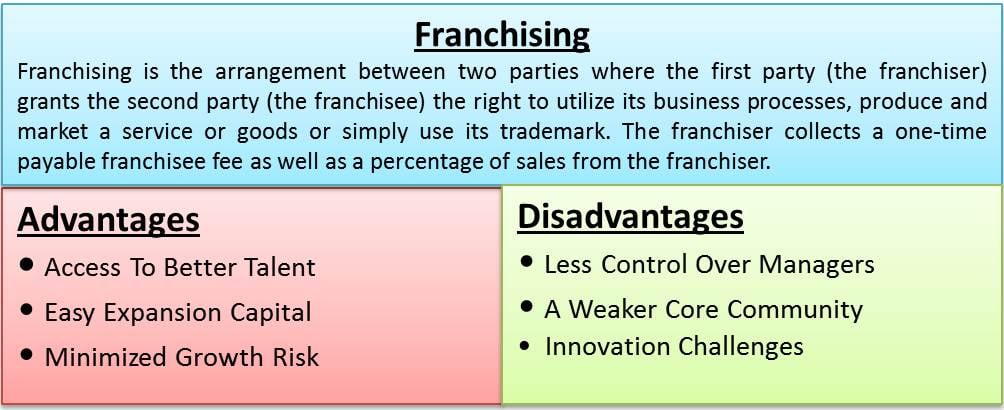Definition of Franchising
Franchising is the arrangement between two parties where the first party (the franchiser) grants the second party (the franchisee) the right to utilize its business processes, produce and market a service or goods or simply use its trademark. The franchiser collects a one-time payable franchise fee and a percentage of sales from the franchisee.
Advantages of Franchising
The following are the advantages:
Access to Better Talent
By franchising your business, you are attracting hard-working people to grow and expand your brand in a number of locations. Talented people choose to take up their own business and gain incentives rather than work under a strict payroll as an employee.
Easy Expansion Capital
A franchise agreement mandates that the franchisee invests the capital. Therefore, you increase the capital under your business without requiring loans from investors or banks.
Minimized Growth Risk

Opening an outlet under the franchise model requires little risk from the franchiser. With a low investment, you can target a large number of areas and earn high royalties. The percentage of return is much higher than opening company-owned outlets.
Disadvantages of Franchising
The following are the disadvantages:
Less Control Over Managers
You cannot have complete hold over the operations of the outlet. The franchisee will run the business as an independent model with different goals. Conflicts between the parties can lead to legal trouble. For example, a franchiser collects a percentage of sales as royalty. The franchisee earns via profits generated in the outlets. A franchiser may issue promotional coupons to boost sales. However, coupons may boost sales but not boost profits. Thus, the franchisee may object to it.
A Weaker Core Community
Franchisees try to gather profits from each other’s efforts in generating business. It isn’t easy to get franchisees to work together compared to hired store managers under one brand name. For example, a franchisee may try to avoid investing towards advertisement expenses as he may take for granted that the other franchisees will do it anyway. He may rely on their expenses for his growth and profits. This may lead to no advertisement at all for the brand name.
Innovation Challenges
Introducing a new idea or concept may prove to be a challenge in the franchise framework. You will have to negotiate with your franchisees and convince them to accept the new introduction instead of your own outlets where you simply put the new idea to use.
Is Franchising Profitable?
Franchisers make money from the success of the franchisees and incur expenses in training and recruiting new franchisees. They require a high level of involvement in the initial setup phase of the franchisee. The initial fee demanded by the franchiser is towards such expenses. This fee should not have a large profit element and should be rather low-key. Having a large profit element will tempt the franchiser to opt for franchisees that may or may not have the capability to operate the business. This will lead to a lot of franchisees failing in the business, and the franchiser will not earn any royalty from the franchisees. This will contain a profit element that follows in the future of the business and can lead to the downfall of the brand.
Moreover, franchisers should have transparency in their profits. They should not try to gain minute profits through the way of supplying products to franchisees either directly or through suppliers. Franchisers at times gain profits from their nominated suppliers on purchases made by franchisees.
The franchiser should only earn from the management service fee, which is a percentage of the turnover generated by the franchisee. This fee is towards the assistance provided by them to the franchisee and also should contain a profit element.
Conclusion
In a nutshell, franchising is a corporate restructuring strategy that may be a beneficial option for both a franchiser and a franchisee. However, if the framework is well framed by the franchiser, the brand and the franchisee will prosper in the long run.
Quiz on Franchising
Let’s take a quick test on the topic you have read here.


Thank you for a good article, I have learn soo much
Very valuable information, it is not at all sites that we find this, congratulations I was searching for something like that and found it here.
Best regards,
Demir Griffin